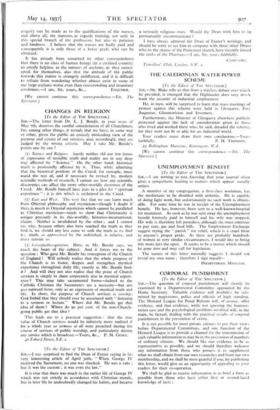CHANGES IN RELIGION
[To the Editor of THE SPECTATOR.]
SIR,—The letter from Dr. L. J. Bendit, in your issue of May 7th, deserves the careful consideration of all Churchmen, for, among other things, it reveals that we have, in some way or other, given the public an entirely misleading view of the purpose and nature of our services, and, accordingly, they are judged by the wrong criteria. May I take Mr. Bendit's points one by one ?
(I) Science and Religion. Surely neither old nor few forms of expression of invisible truth and reality are in any deep way affected by " Science." On the other hand, historical truth is profoundly affected by it. Thus, while admitting that the historical portions of the Creed, for example, must stand the test of, and if necessary be revised by, modern scientific methods of research, I cannot see how any scientific discoveries can affect the more other-worldly doctrines of the Creed. Mr. Bendit himself later puts in a plea for " spiritual experience " : it is this which is enshrined in the Creed.
(2) East and West. The very fact that we can learn much from Oriental philosophy and mysticism—though I doubt if there is much in Oriental mysticism which cannot be paralleled in Christian mysticism—tends to show that Christianity is unique precisely in its this-worldly, historico-incarnational, claims. Neither is invalidated by the other ; and I cannot see why, because others also have reached the truth as they find it, we should any less cease to seek the truth as we find it ; truth, as apperceived by the individual, is relative, and must remain so.
(3) Introspective-quietism. Here, as Mr. Bendit says, we reach the heart of the subject. And it forces me to the question : Who gave Mr. Bendit his conception of the Church of England ? Will nobody realise that the whole purpose of the Church is to foster, deepen and strengthen mystical experience throughout daily life, exactly as Mr. Bendit finds it ? And will they not also realise that the point of Church services is simply to share corporately also in mystical experi- ence ? This may take sacramental forms—indeed to the Catholic Christian the Sacraments are a necessity—but not qua outward form, only as an expression of mystical truth and life. In short, the purpose of Church services is worship. God forbid that they should ever be associated with " listening to a sermon or lecture." Where did Mr. Bendit get that idea of them ? Where do 90 per cent. of the non-Church- going public get that idea ?
• This leads me to a practical suggestion : that the true value of Church services would be infinitely more realised if for a whole year no sermons at all were preached during the course of services of public worship, and particularly during any service which is broadcast.—Yours, &c., P. M. GEDGE.
40 Tabard Street, S.F. 1.














































 Previous page
Previous page